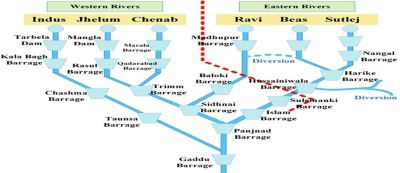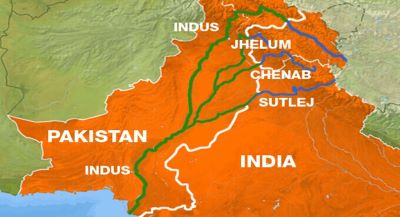Context
India has intensified its call for renegotiating the 1960 Indus Waters Treaty (IWT) in its fourth notice to Pakistan since January 2023, demanding meetings of the Permanent Indus Commission (PIC) until Pakistan agrees to engage in talks. This push follows a stalemate in what was once considered a model water-sharing agreement.
Overview
- It was signed in Karachi on September 19, 1960, by Indian Prime Minister Jawaharlal Nehru and Pakistani President Ayub Khan.
- The treaty allows India to generate hydroelectric power using run-of-the-river projects on the western rivers, provided they meet specific design and operational criteria. Pakistan reserves the right to challenge the designs of these projects.
- The term "Eastern Rivers" refers to the Sutlej, Beas, and Ravi collectively. In contrast, "Western Rivers" denotes the Indus, Jhelum, and Chenab together. The phrase "the rivers" encompasses all six rivers: the Sutlej, Beas, Ravi, Indus, Jhelum, and Chenab.
The dispute resolution mechanism
- Bilateral Negotiation: Disputes are first addressed through discussions between India and Pakistan, typically involving the Permanent Indus Commission (PIC), which includes representatives from both nations.
- Neutral Expert: If negotiations are unsuccessful, either party may request a neutral expert to evaluate the issue. This expert's responsibility is to analyze the technical aspects of the dispute and offer recommendations.
- Permanent Court of Arbitration (PCA): If the dispute remains unresolved after consulting the neutral expert, either country can bring the matter before the PCA, which acts as an international arbitration body to address conflicts related to treaty interpretation and enforcement.
- International Involvement: The World Bank, as a signatory and guarantor of the treaty, plays a role in facilitating discussions and ensuring adherence to the treaty's provisions.
Key provisions of IWT
- Water Allocation
- Eastern Rivers: India has full rights to the waters of the Sutlej, Beas, and Ravi.
- Western Rivers: Pakistan holds exclusive rights to the waters of the Indus, Jhelum, and Chenab, while India can use these rivers for specific purposes, such as hydroelectric projects, under certain conditions.
- Eastern Rivers: India has full rights to the waters of the Sutlej, Beas, and Ravi.

Curtesy to science direct
- Run-of-the-River Projects: India is allowed to develop run-of-the-river hydroelectric projects on the western rivers, provided they meet design and operational criteria to minimize impact on Pakistan’s water supply.
- Information Sharing: Both nations are required to exchange information regarding water flows, projects, and plans related to the river system to enhance transparency and cooperation.
- Construction of Dams: Guidelines are provided for constructing dams and storage projects, which include limits on storage capacity and operational protocols.
Position of India and Pakistan on the Indus Waters Treaty (IWT
- India’s Position
- Commitment to the Treaty: India stresses its dedication to the IWT and its provisions, asserting that it has consistently followed the treaty's guidelines.
- Rights to Development: India claims the right to develop hydroelectric projects on the western rivers, as long as they meet the treaty’s design and operational criteria.
- Water Security Concerns: India expresses concerns about water security and management, advocating for adjustments to the treaty to address contemporary challenges, such as climate change.
- Preference for Dialogue: India favors resolving disputes through dialogue and has historically encouraged bilateral discussions instead of resorting to international arbitration.
- Commitment to the Treaty: India stresses its dedication to the IWT and its provisions, asserting that it has consistently followed the treaty's guidelines.
- Pakistan’s Position
- Defending Water Rights: Pakistan vigorously defends its rights to the waters of the Indus, Jhelum, and Chenab, considering them crucial for its agricultural and economic stability.
- Objections to Indian Projects: Pakistan has voiced objections to various Indian projects, arguing that they violate the treaty's terms and pose a threat to its water supply.
- Seeking Neutral Experts and PCA Involvement: Pakistan has called for the involvement of neutral experts and has sought arbitration through the Permanent Court of Arbitration (PCA) to address disputes related to Indian projects.
- Interest in Renegotiation: Pakistan has expressed a willingness to renegotiate certain aspects of the treaty to ensure its water security, particularly amid rising regional tensions.
- Defending Water Rights: Pakistan vigorously defends its rights to the waters of the Indus, Jhelum, and Chenab, considering them crucial for its agricultural and economic stability.
The way ahead
- Reinforcing Dialogue: Both countries should focus on open and constructive discussions to address concerns and build trust. Regular meetings of the Permanent Indus Commission (PIC) can aid this effort.
- Tackling Contemporary Challenges: The treaty should adapt to modern issues such as climate change, population growth, and evolving water needs. This may involve exploring sustainable water management practices and joint projects.
- Improving Transparency: Enhancing transparency in sharing water data and project information can help reduce misunderstandings. Regular updates on water flows and usage can promote greater cooperation.
- Strengthening Dispute Resolution: Enhancing existing dispute resolution mechanisms, including clearer procedures for engaging neutral experts and the PCA, can create a more effective framework for conflict resolution.
- Collaborative Water Management Projects: India and Pakistan could consider joint initiatives for water conservation, flood management, and hydropower generation that would benefit both nations.
- Seeking International Support: Involving international organizations, such as the World Bank, to facilitate discussions and offer technical assistance could be beneficial in addressing complex issues.
- Engaging the Public: Involving local stakeholders, including farmers and communities reliant on the river systems, can provide valuable perspectives and foster grassroots support for cooperative efforts.
Conclusion
revitalizing the Indus Waters Treaty requires constructive dialogue, adaptation to modern challenges, and collaborative water management initiatives. By fostering transparency and involving local stakeholders, both India and Pakistan can work toward a sustainable and mutually beneficial approach to shared water resources.
|
Probable questions for upsc mains 1. Explain the significance of the Indus Waters Treaty of 1960 in India-Pakistan relations. How has it evolved over the years? 250 words (15 marks) 2. Discuss the key provisions of the Indus Waters Treaty. How do these provisions address the water rights of both India and Pakistan? 150 words (10 marks) |
Source: The Hindu








